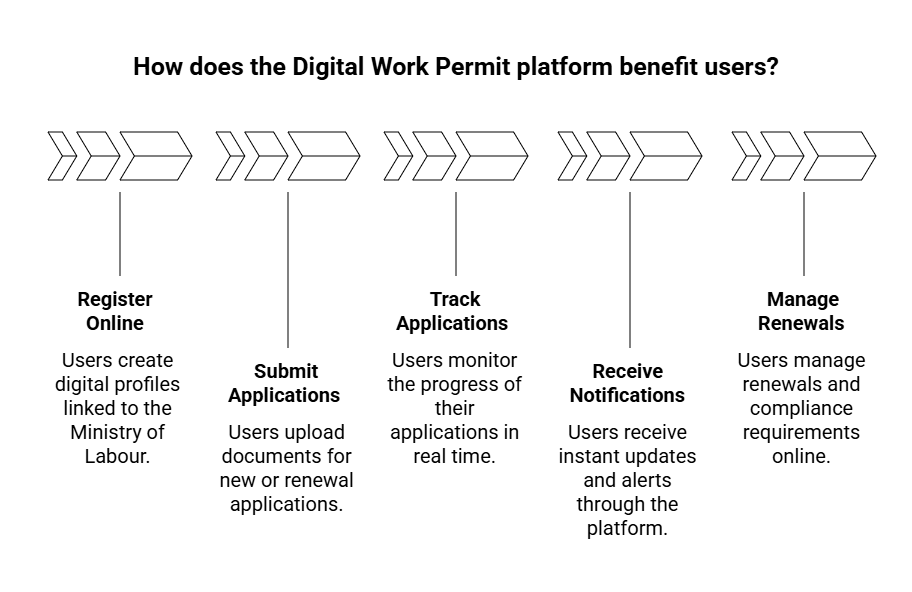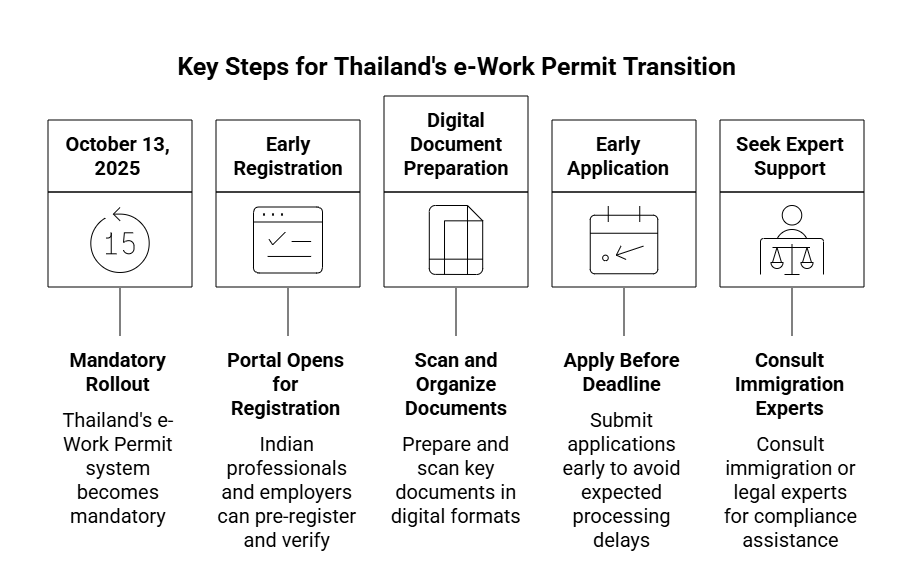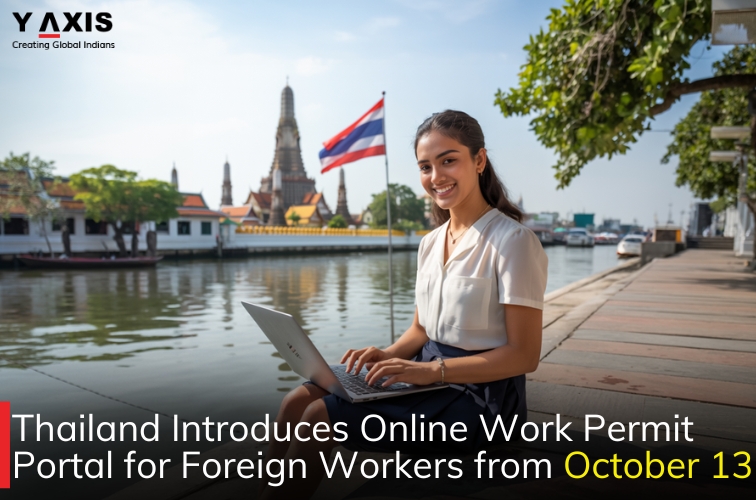Posted on October 14 2025
Thailand Introduces Online Work Permit Portal for Foreign Workers from October 13
By , Editor
Updated November 15 2025
Highlights: Thailand Introduces Mandatory ‘e-Work Permit’ Portal for Employers and Foreign Workers
- Thailand introduces a new online ‘e-Work Permit’ system for all foreign workers and employers starting October 13, 2025, making digital applications and registrations mandatory.
- The system aims to modernize the work permit process, reduce paperwork, enable real-time tracking, and speed up application approvals.
- Employers and foreign employees must verify their identity through the ThaiID mobile app before accessing the new platform.
- During the transition phase, limited manual submissions may still be accepted, though full digital adoption is expected soon after launch.
- Authorities have cautioned of minor delays initially as the system stabilizes and users adapt to the new online process
*Want to work abroad? Get in touch with experts at Y-Axis to guide you with the process.
Thailand Simplifies Work Permits with a New Online ‘e-Work Permit’ Platform
Thailand’s Ministry of Labour has officially announced the launch of the e-Work Permit system, a unified online platform designed to handle all work permit applications for foreign nationals. This initiative reflects Thailand’s ongoing push to modernize and simplify administrative procedures while improving efficiency in workforce management.
Under the new system, both foreign employees and Thai employers must register on the e-Work Permit portal. Before accessing the system, company directors or authorized personnel are required to verify their identities using the ThaiID app, a crucial security step to prevent identity fraud.
The move is expected to significantly cut down paperwork, eliminate repetitive submissions, and enable real-time tracking of applications—something that was previously unavailable under the manual system.
Authorities, however, have cautioned that initial processing delays may occur as users and officials adapt to the new system. During the early phase, limited cases may still be accepted manually, but this transitional flexibility has not yet been officially confirmed.
*Want to work in Thailand? Sign up with Y-Axis to guide you with the process.
Why Thailand Is Going Digital with Work Permits
Thailand’s Ministry of Labour is making a bold move by shifting the entire foreign work permit process to a digital-first model through the e-Work Permit system. Under this unified platform, foreign workers and Thai employers alike will be able to:
Under the new online platform, both Thai employers and foreign employees can now handle the entire work permit process digitally. The e-Work Permit system is designed to streamline all administrative steps and make them accessible through a single online portal.
Here’s what users can do:
- Register themselves and their companies online: Employers and employees can create verified digital profiles linked to the Thai Ministry of Labour’s central database. This eliminates the need for repetitive paperwork or physical verification.
- Submit new and renewal applications: Whether applying for a first-time work permit or renewing an existing one, users can upload required documents directly to the system, saving time and minimizing human error.
- Track applications in real time: The digital system allows applicants to monitor the progress of their application at every stage, from submission to review to approval, and ensuring complete transparency.
- Receive notifications and updates instantly: Instead of waiting for mailed documents or phone calls, applicants will receive automated alerts and status updates through the platform and mobile notifications.
- Manage renewals, changes, and compliance requirements: The system enables easy online modifications, such as changes in job title, company details, or employment location. It also keeps a record of compliance history, making renewals faster in the future.

How Thailand’s e-Work Permit System Benefits Indian Professionals
For Indian nationals eyeing employment opportunities in Thailand—especially in sectors like IT, education, hospitality, manufacturing, and services—the e-Work Permit system offers several tangible benefits:
- Less bureaucracy: Say goodbye to stacks of paper forms and multiple submissions.
- Convenience: File or check your permit status from anywhere, anytime—no more multiple visits to labour offices.
- Transparency: The system allows you to see exactly where your application is in the approval chain.
- Reduced wait times (once stable): Automated processing and fewer manual handoffs can shorten turnaround.
- Better compliance and security: Identity verification with ThaiID and biometrics helps reduce fraud risk and protects employees.
- Consistent records: All your permit history, renewals, and changes will be logged in a centralized database accessible to authorised agencies.
However, during the early days, expect some delays or occasional system glitches. The trick is to be prepared, apply early, and ensure your documents are in perfect order before submission.
Also, read…
Thailand eases long term visa policy from Feb 2025. Apply Now!
How Indian Professionals and Employers Can Prepare for Thailand’s e-Work Permit System
With Thailand’s e-Work Permit becoming mandatory from October 13, 2025, Indian professionals and employers should take a few simple steps to stay prepared and avoid delays.
Step 1: Mark the Launch Date
Note October 13, 2025, as the official rollout. Keep track of updates from the Ministry of Labour and Department of Employment for new guidelines.
Step 2: Register and Verify Early
Pre-register on the e-Work Permit portal once it opens, and complete ThaiID verification to gain system access.
Step 3: Get Digital Documents Read
Prepare and scan key documents — contracts, certificates, company details, and medical reports — in clear, digital formats.
Step 4: Plan for Delays
Expect initial processing delays as the system stabilizes. Apply early to avoid disruptions.
Step 5: Seek Expert Support
If unsure, consult immigration or legal experts for smooth registration and compliance.
Note: Preparing ahead ensures Indian workers and employers can transition seamlessly into Thailand’s new digital work permit system.

*Are you looking for step-by-step assistance with overseas immigration? Contact Y-Axis, the world’s No. 1 overseas immigration consultancy!
For recent immigration updates, check out Y-Axis News Page!
FAQs
1. What is Thailand’s new online work permit system?
Thailand’s new e-Work Permit system is a fully digital platform launched by the Ministry of Labour to simplify and modernize the work permit process for foreign workers. It allows both employers and employees to apply, renew, and track work permits entirely online. The platform eliminates the need for physical paperwork and enables real-time status updates, document uploads, and communication with authorities. It also integrates identity verification through the ThaiID app, making the process more secure and transparent. This move aims to make work permit processing faster, more efficient, and accessible across Thailand.
2. When will Thailand’s online work permit system become mandatory?
The e-Work Permit system will become mandatory on October 13, 2025. From this date, all employers and foreign employees in Thailand must use the online platform for work permit applications and registrations. The Ministry of Labour has advised companies and individuals to register in advance and verify their identity through the ThaiID app before the system goes live. While authorities may temporarily accept manual submissions during the transition phase, digital filing will be the new standard for all foreign worker registrations and permit renewals across Thailand.
3. Who is required to use the new online work permit system in Thailand?
All foreign employees working in Thailand and their Thai employers are required to use the new e-Work Permit system. This includes individuals applying for new work permits as well as those renewing existing ones. Employers must register their companies on the platform, while authorized company representatives need to verify their identity through the ThaiID app. The system applies to both regular businesses and those operating under Thailand’s Board of Investment (BOI) schemes. The digital process ensures consistency, faster approvals, and transparency in foreign employment management across the country.
4. What is the objective of introducing the online work permit system?
The main objective of Thailand’s e-Work Permit system is to streamline administrative procedures, reduce paperwork, and improve transparency in managing foreign workers. It aims to make the application and approval process faster, more accurate, and fully traceable through digital tracking. The online system also enhances data security and reduces the need for in-person visits, benefiting both employers and employees. By adopting digital technology, Thailand seeks to modernize its labour management system and align with the government’s broader goal of creating a smart, efficient, and paperless public administration framework.
5. Which government department manages the online work permit system?
The Ministry of Labour, through the Department of Employment, is responsible for managing Thailand’s new e-Work Permit system. The Ministry oversees the overall policy and implementation, while the Department handles registrations, application processing, and issuance of work permits. It also manages system support, updates, and compliance monitoring. The Department of Employment is the main contact point for both Thai employers and foreign workers using the platform. This centralized digital management ensures a uniform process and quicker coordination between regional labour offices and government agencies.
6. Will existing work permit holders need to switch to the online system?
Yes, existing work permit holders will gradually need to transition to the e-Work Permit system. Once the system becomes mandatory, all future renewals, amendments, and updates to work permits must be processed online. Existing paper-based permits will remain valid until their expiration dates, but renewals and modifications will have to be completed through the new digital platform. Authorities are expected to allow a short adjustment period during which manual submissions might still be accepted. Over time, all records will be moved to the centralized online database for uniformity and tracking.
7. What are the benefits of Thailand’s online work permit system for foreign workers?
The e-Work Permit system offers several benefits to foreign workers, including faster processing, 24/7 online access, and reduced paperwork. Applicants can now track the progress of their applications in real time and receive updates directly through the portal. The system also minimizes in-person visits, saving time and travel costs. With enhanced identity verification through the ThaiID app, the process becomes more secure and transparent. Centralized records make renewals and changes easier in the future. Overall, the digital platform makes working in Thailand more convenient, efficient, and user-friendly for foreign professionals.
8. Do employers need to register before using the online work permit platform?
Yes, employers are required to register on the e-Work Permit platform before submitting any applications for foreign employees. The company’s director or authorized representative must verify their identity through the ThaiID mobile app to gain access to the system. Once verified, they can apply for new work permits, manage renewals, and track applications online. Early registration is recommended to avoid delays when the platform becomes mandatory. This step ensures that companies are authorized to handle employment processes digitally and remain compliant with Thailand’s new labour regulations.
9. Does the new system apply to both new and renewal work permit applications?
Yes, the e-Work Permit system applies to both new applications and renewal of existing work permits. From October 13, 2025, all types of work permit submissions — whether first-time, renewal, or modification — must be completed through the online platform. The unified portal allows consistent data management and tracking for all cases. This integration ensures that both new applicants and current permit holders experience faster approvals and reduced paperwork. It also helps the government maintain accurate, up-to-date employment records for all foreign nationals working in Thailand.
10. How can foreign workers access the online work permit system in Thailand?
Foreign workers can access the e-Work Permit platform by registering online once it goes live. They must upload required documents such as passports, employment contracts, and education certificates in digital format. After submission, they can track their application status through the system. Once approved, they may be asked to visit a designated Work Permit Service Centre to complete biometric verification and collect their permit card. The system can be accessed 24/7, making it easier for workers to apply, renew, or update their work permits from anywhere in Thailand.
Tags:
Thailand e-work permit
Thailand work permit
work in Thailand
Thailand work visa
e-work visa in Thailand
e-work permit in Thailand
work abroad
work overseas
overseas immigration news
Thailand government work permit
e-Work Permit platform
Share
Options for you by Y-Axis
Get it on your mobile
Get News alerts
Contact Y-Axis

